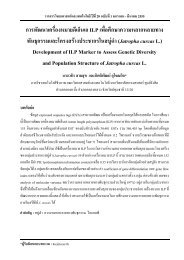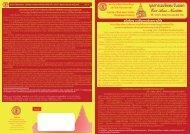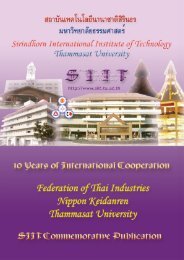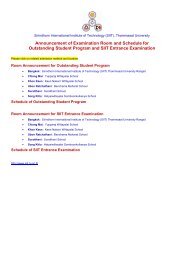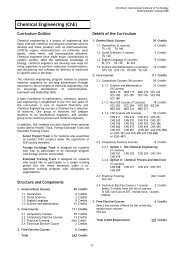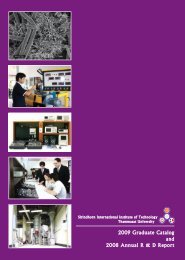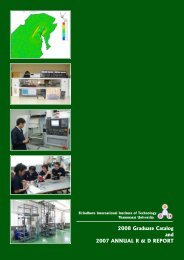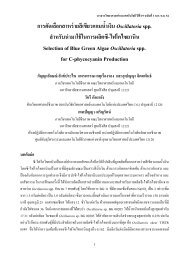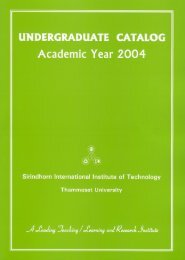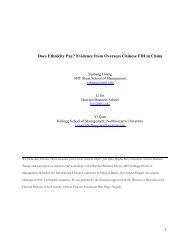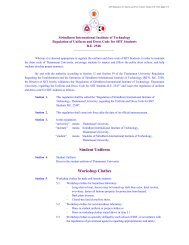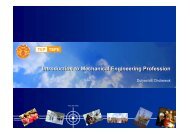Undergraduate Catalog, Academic Year 2011 - Sirindhorn ...
Undergraduate Catalog, Academic Year 2011 - Sirindhorn ...
Undergraduate Catalog, Academic Year 2011 - Sirindhorn ...
You also want an ePaper? Increase the reach of your titles
YUMPU automatically turns print PDFs into web optimized ePapers that Google loves.
<strong>Sirindhorn</strong> International Institute of Technology<br />
<strong>Undergraduate</strong> <strong>Catalog</strong> <strong>2011</strong><br />
equation for a control mass and applications. Energy and<br />
mass equations for a control volume and applications.<br />
Second law efficiencies for control mass and control<br />
volume applications. Chemical availability. Energy<br />
analysis of engineering cycles. Thermoeconomics.<br />
MES 422 Thermal System Design 3(3–0–6)<br />
Prerequisite: (MES 321 and MES 341) or<br />
consent of Head of School<br />
Design procedure. Comparison between a workable<br />
system and optimum system. Equation fitting for<br />
equipment and processes characterization. Modeling of<br />
equipment and processes based on physical laws.<br />
Simulation of thermal systems. Selected optimization<br />
techniques such as Lagrange multiplier, search methods,<br />
linear programming, etc.<br />
MES 434 Mechanical System Design 3(1-6-2)<br />
Prerequisite: MES 333 or consent of Head of School<br />
Mechanical engineering system design involving practical<br />
problems in various industries. Students, working in<br />
groups, will investigate the design methodology and<br />
process from concept through final design including<br />
detailed analysis of all mechanical components of the<br />
system, by which knowledge of all engineering<br />
disciplines, is required. Projects are proposed from<br />
various areas of study within mechanical engineering.<br />
Students submit a final report and present their projects<br />
at the end of semester.<br />
MES 443 Environmental Control Engineering 3(3–0-6)<br />
Prerequisite: MES 342 or consent of Head of School<br />
Review of properties of moist air and refrigerants,<br />
refrigeration cycles, refrigeration processes and<br />
cryogenics. Solar energy fundamentals and applications.<br />
Heat transfer in building structures. Heating and cooling<br />
loads. Thermal environmental control systems. Design of<br />
refrigeration and air conditioning systems. Energy<br />
conservation in buildings.<br />
MES 444 Renewable Energy Resources 3(3-0-6)<br />
Prerequisite: None<br />
Global and regional resources, conversion technologies<br />
and economics of renewable energy such as hydropower,<br />
biomass energy, solar energy, wind energy and<br />
geothermal energy.<br />
MES 462 Turbomachinery 3(3–0–6)<br />
Prerequisite: ((MES 310 or MES 311) and MES 341) or<br />
consent of Head of School<br />
Review of thermodynamics of compressible flow.<br />
Principles, designs and applications of centrifugal and<br />
axial flow machines, i.e. centrifugal turbine and<br />
compressor, axial flow turbine and compressor, impulse<br />
and reaction steam turbine and laval nozzle. Steam and<br />
gas turbine plants: theories, applications, performance<br />
characteristics of practical cycles. Erosion problems in<br />
steam and gas turbine components.<br />
MES 471 Electrical Energy Management 3(3-0-6)<br />
Prerequisite: Senior or junior standing or<br />
consent of Head of School<br />
Basic concepts. Management of electrical energy.<br />
Distribution circuits and equipment. Electrical tariff.<br />
Load and demand management. Power factor and loss<br />
management. Applications of thermodynamics to the<br />
analysis of electromagnetic circuits, transformer, motor<br />
and generator.<br />
MES 472 Advanced Engineering Materials 3(3–0–6)<br />
Prerequisite: MES 371 or consent of Head of School<br />
Mechanical behavior and environmental degradation of<br />
polynamic metal and ceramic matrix composites.<br />
Manufacturability of advanced engineering materials.<br />
Use of composite materials in novel engineering designs.<br />
Material selection methods using such criteria as a costto-strength<br />
basis or weight-to-strength basis to the<br />
design of mechanical products.<br />
MES 473 Energy Economics 3(3-0-6)<br />
Prerequisite: None<br />
Depletion of energy resources. Energy pricing. Fiscal<br />
instruments of energy policy. Uncertainty and energy<br />
policy. Energy analysis and energy policy.<br />
Environmental policy and energy development. Energy<br />
analysis and energy policies of selected countries.<br />
Energy project appraisal.<br />
MES 474 Thermal Energy Management 3(3-0-6)<br />
Prerequisite: Senior or junior standing or<br />
consent of Head of School<br />
Efficient uses of thermal equipment and systems such as<br />
boilers and steam equipment, evaporator and condenser,<br />
pre-heater and economiser, dryers and drying systems,<br />
etc.<br />
MES 493 Extended Mechanical Engineering 3(1-6-2)<br />
Laboratories<br />
Prerequisite: (MES 391 and (MES 392 or MES 393)) or<br />
consent of Head of School<br />
Students are required to conduct extended tests and<br />
experiments on thermo-fluid systems such as fluid<br />
machinery systems, gas turbines, refrigeration and air<br />
conditioning systems, etc. Component modeling and<br />
system simulation are expected in the reports submitted<br />
for grading.<br />
MES 494 Special Topic I in Mechanical 3(3–0–6)<br />
Engineering<br />
Prerequisite: None<br />
New topics or areas of study not offered in other<br />
mechanical engineering courses. Topics may vary from<br />
semester to semester and will not be the same as the<br />
one offered in Special Topic II, MES 495.<br />
MES 495 Special Topic II in Mechanical 3(3–0–6)<br />
Engineering<br />
Prerequisite: None<br />
New topics or areas of study not offered in other<br />
mechanical engineering courses. Topics may vary from<br />
semester to semester and will not be the same as the<br />
one offered in Special Topic I, MES 494.<br />
MTS 211 Principles of Business 3(3-1-5)<br />
Prerequisite: None<br />
This subject provides a broad overview of the world of<br />
business preparing students for various business-related<br />
subjects. It offers a comprehensive introduction of every<br />
aspect of business and the environment in which business<br />
operates. Emphasis is placed upon business organizations<br />
in general, including the objectives and overall<br />
responsibilities of business enterprises within their social<br />
and economic context. The fundamentals of business<br />
which spans the range of all functional areasmanagement,<br />
accounting, marketing, operations,<br />
information systems, finance and legal studies will be<br />
introduced. Students will learn the language of the<br />
64




